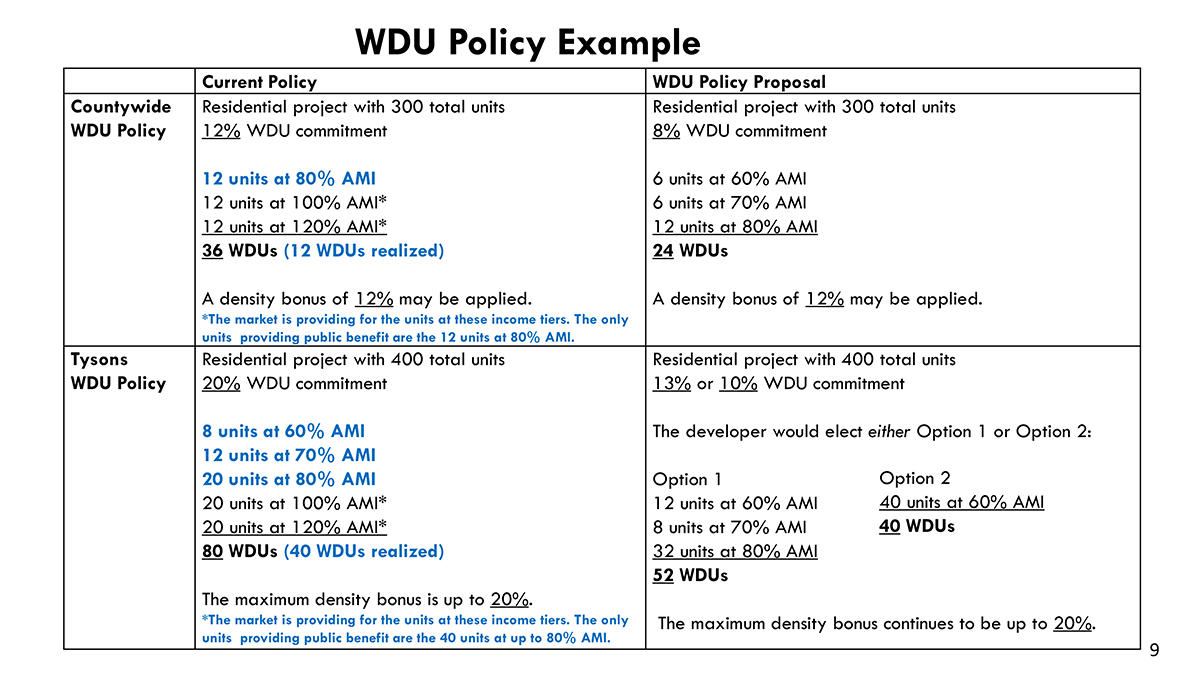Amendment to the Workforce Dwelling Unit Policy Recommended to Align with Market Conditions and Increase Affordability
 In 2007, Fairfax County adopted the Workforce Dwelling Unit Policy (WDU Policy) as a proffer-based incentive to encourage housing at a variety of affordability levels in mixed-use activity centers. It allows developers to receive up to 12 percent “density bonus” on their development in exchange for a commitment of Workforce Dwelling Units (WDUs) across a variety of income levels. In 2010, a WDU Policy was developed specifically for the redevelopment of Tysons Corner to allow for a density bonus of up to 20 percent.
In 2007, Fairfax County adopted the Workforce Dwelling Unit Policy (WDU Policy) as a proffer-based incentive to encourage housing at a variety of affordability levels in mixed-use activity centers. It allows developers to receive up to 12 percent “density bonus” on their development in exchange for a commitment of Workforce Dwelling Units (WDUs) across a variety of income levels. In 2010, a WDU Policy was developed specifically for the redevelopment of Tysons Corner to allow for a density bonus of up to 20 percent.
At the time, the policy was designed to meet the housing need for households earning between 60 and 120 percent of the area median income (AMI). However, a county task force was convened in March 2019 to consider adjustments to the affordability requirements. The County and development community determined units at the 100 and 120 percent of the AMI were in effect above market rate unit rents in many cases. As a result, the recommended policy amendments reflect the market rate rent and would better meet the growing need to serve county residents with low- and moderate-income.
"The WDU Policy has been a useful tool in introducing about 1,600 units into the county,” said Tom Fleetwood, Director of Fairfax County’s Department of Housing and Community Development. “In looking at how the market has evolved over the last decade, we see that market rate rents have not increased at the projected rate, and we are seeing that workers earning 100 and 120 percent of the median income are accommodated naturally through market rate units. It’s time that the policy be updated to more effectively provide units with affordability at a variety of income bands below market rate rents..”
VIDEO: Housing Committee – WDU Task Force Policy Recommendations
(Presentation begins at the 21-minute mark)
PRESENTATION: WDU Task Force Policy Recommendations
The recommendations maintain the existing density bonus for developers and replace the requirement for units affordable to households earning between 100 and 120 percent of the AMI that are being met by market rate units by increasing the commitment for units at the 60, 70 and 80 percent levels. Overall, the number of units developers would commit to in exchange for density bonus is decreased; however, the recommendations result in a significant increase in affordability to the households with low- and moderate-income that the program is intended to serve.

“The Workforce Dwelling Unit Task Force has done an outstanding job researching this issue and blending the sometimes competing needs and interests of these projects with the mutual desire of our housing community to provide affordable housing in a sustainable and feasible manner,” said Fleetwood.
NEXT STEPS:
The Fairfax County Departments of Housing and Community Development and Planning and Development are currently working to develop an extensive community engagement plan in order to educate, answer questions and collect additional feedback and suggestions from the community at-large prior to bringing recommendations to the Board of Supervisors amending the Comprehensive Plan Housing and Land Use elements of the Policy Plan, the Area Plans and the WDU Policy Administrative Guidelines. Public meetings and engagement will likely begin in late summer/early fall.
###
About the WDU Task Force: The WDU Task Force was organized in March of 2019 by the Fairfax County Board of Supervisors to conduct a thorough review of the county’s WDU Policy and propose recommended policy reforms to the WDU Rental Program to ensure that the policy provides units with lower affordability than market rate rents in order to serve its intended population. The task force includes county staff from the Departments of Planning and Development and Housing and Community Development, representation from the Fairfax County Redevelopment and Housing Authority and Planning Commission, and housing industry representatives and advocates. The task force received independent data and market analysis from the Virginia Tech Center for Housing Research.

